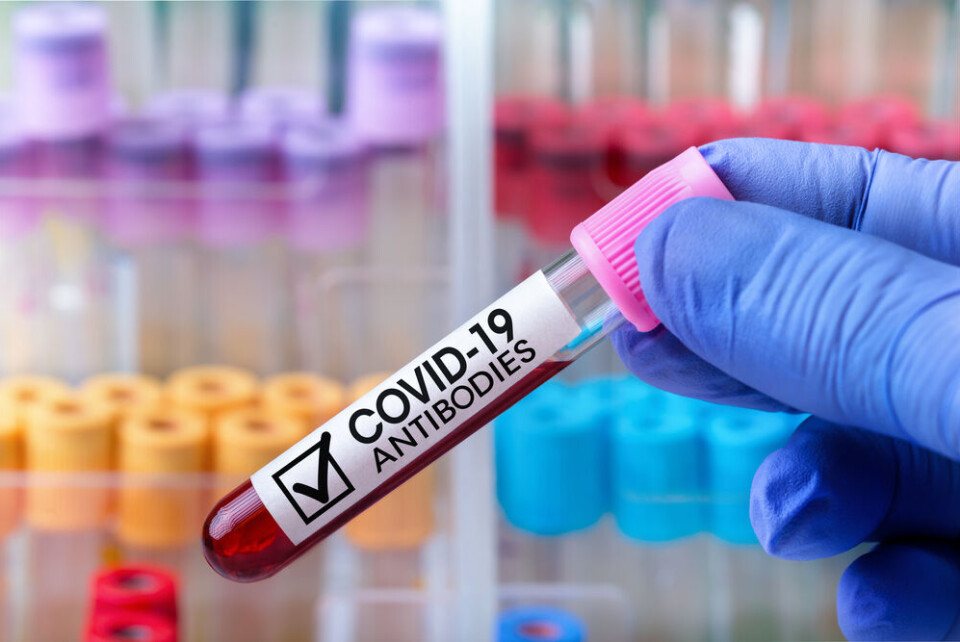-
BBC says no plans for content subscription service in France
Broadcaster’s ‘Sounds’ app has been unavailable since July 2025
-
France heat: 130 records set on February 25 - will it continue?
Seasonal records smashed as far north as Normandy and in the Alps
-
Aer Lingus launches summer Nice-Cork service
Two flights per week between May and September link south of Ireland and France
EU orders promising treatment for severe Covid-19 from UK pharma firm
The medicine works using laboratory-reproduced antibodies. Early trials have found that it reduces the risk of hospitalisation or death in high-risk patients by 85%

The European Union has ordered more than 220,000 doses of a promising Covid-19 treatment made by British pharmaceutical giant GlaxoSmithKline. The treatment is currently being evaluated by the EU.
The European Commission told Reuters that the new medication, sotrovimab, is a type of “monoclonal antibody”.
It uses antibodies that have been genetically obtained. They are cloned from the white blood cells of patients who have had a non-severe form of Covid-19.
The sotrovimab treatment is also known as VIR-7831 and GSK4182136. It is administered via an intravenous drip.
As the EMA explains on its website: “A monoclonal antibody is a type of protein that attaches to a specific structure (called an antigen). Sotrovimab is designed to attach to the spike protein of SARS-CoV-2, limiting the ability of the virus to enter the body’s cells.”
French health research institute l’Institut national de la santé et de la recherche médicale (Inserm) explains: “Monoclonal antibodies are selected for their effectiveness at targeting a specific intrusion, and reproduced in large quantities in a lab to be given to those who need them.”
The European Medicines Agency (EMA) is currently evaluating the treatment with a view to obtaining a marketing authorisation. The evaluation began on May 7.
In France, the sotrovimab monoclonal antibody treatment has already been successfully used.
In mid-March, France was given temporary authorisation to use the medicine on adults at risk of developing severe forms of the virus.
More than 1,000 patients benefited from the treatment, said drug safety agency l’Agence nationale de sécurité du médicament (ANSM).
Sotrovimab also received emergency authorisation in the US, for use in high-risk adults and children. Trials showed that it resulted in an 85% reduction in the risks of hospitalisation or death in high-risk adult outpatients compared to a placebo.
The EMA’s Committee for Medicinal Products for Human Use (CHMP) has already reviewed the drug, and said it can be used to treat confirmed Covid-19 in people aged 12 and over, who do not require supplemental oxygen therapy, and who are at risk of progressing to severe Covid-19.
In May, Dr Adrienne E. Shapiro, an infectious disease specialist at Fred Hutchinson Cancer Research Center and investigator in the medication trial, said: “Monoclonal antibodies such as sotrovimab are potentially one of our most effective tools for fighting Covid-19.
“While preventive measures, including vaccines, can reduce the total number of cases, sotrovimab is an important treatment option for those who become ill with Covid-19 and are at high risk – allowing them to avoid hospitalisation or worse.”
Monoclonal antibody technology research was awarded a Nobel Prize for Medicine in 1984. Researchers Niels K. Jerne, Georges J.F. Köhler and César Milstein were recognised “for theories concerning ‘the specificity in development and control of the immune system’ and the discovery of ‘the principle for production of monoclonal antibodies’.”
The technology is already used in other forms in France to treat a number of conditions, including cancer, Crohn’s disease and rheumatoid arthritis, and in transplant patients.
Related stories
Million extra Covid tests taken in France since health pass extension
Moderna Covid vaccine approved in France for 12-17 year olds
France orders 30,000 doses of Nantes lab's Xav-19 Covid treatment
Positive signs for Nantes lab's Covid-19 treatment
























